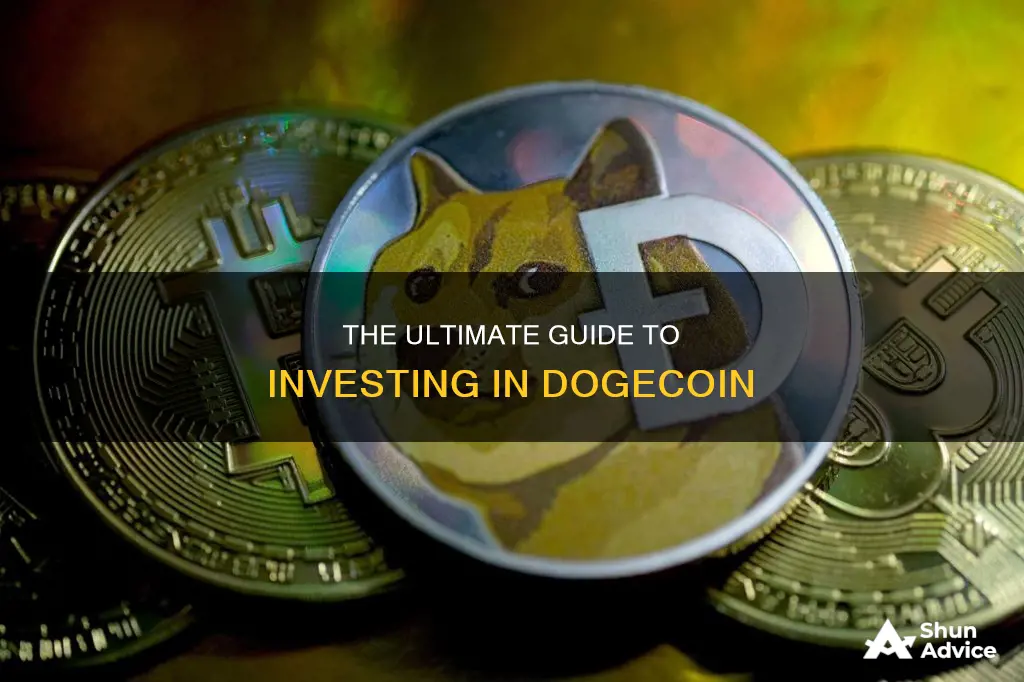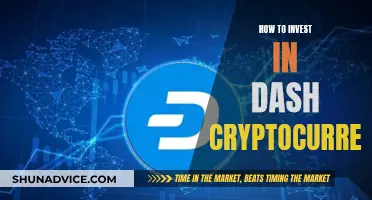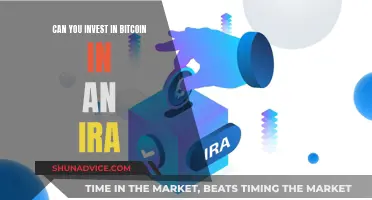
Dogecoin is a cryptocurrency that was initially created as a joke, poking fun at the wild speculation of the crypto market. Despite its light-hearted origins, it has gained significant attention due to its meme-inspired branding and support from celebrities such as Elon Musk. Dogecoin's value has surged in the past, but it is important to note that it is a risky and volatile investment.
If you are considering investing in Dogecoin, there are a few steps you should take. Firstly, you need to decide whether Dogecoin is the right investment for you, keeping in mind that it is a risky and volatile asset. If you decide to proceed, the next step is to find a place to buy Dogecoin, such as a cryptocurrency exchange like Coinbase, Kraken, or Binance. You will then need to deposit funds into your account, either through fiat currency or by exchanging other cryptocurrencies for Dogecoin.
It is important to remember that investing in cryptocurrencies is a speculative venture and that you should only invest what you can afford to lose. Conduct thorough research and consult with a qualified professional before making any financial decisions.
What You'll Learn

How to buy Dogecoin
Dogecoin is a decentralised cryptocurrency that was initially created as a joke, parodying Bitcoin. It has since gained significant attention due to its meme-inspired branding and support from Tesla CEO Elon Musk.
- Consider how much you want to invest in Dogecoin: Dogecoin is highly volatile, and it is essential to remember that cryptocurrencies are very risky investments. Dogecoin is uniquely volatile because it has an unlimited supply. For Dogecoin's price to increase or even remain steady, investors have to continually buy more coins. Otherwise, the supply of Dogecoin rises rapidly, and the value of all coins in circulation decreases. When deciding how much to invest, consider your financial situation, investment portfolio, and risk tolerance.
- Choose a cryptocurrency exchange: To purchase Dogecoin, you will need to open an account with a cryptocurrency exchange, where buyers and sellers meet to exchange cryptocurrency for dollars. Popular exchanges include Coinbase, Kraken, and Binance. You can also purchase Dogecoin using investment apps like Robinhood.
- Set up an account: Sign up by providing information such as your email address, name, and phone number. You may also need to verify your account with personal details like proof of address and undergo a Know Your Customer (KYC) verification process.
- Deposit funds into your account: You can deposit money into your cryptocurrency account through various methods, including bank transfers, debit cards, and wire transfers. The availability of these methods may depend on your location and the exchange's policies.
- Place your order for Dogecoin: Once your money is in your account, search for Dogecoin or enter its ticker symbol, DOGE, on the exchange's trading platform. Then, pick your trade type and input the dollar amount you want to invest or specify how many Dogecoins you want to buy.
- Consider your storage options: When you buy Dogecoin, it is typically stored in your exchange's or brokerage's crypto wallet. However, some investors prefer to withdraw their crypto from the exchange and store it in another wallet. You can choose between a hot wallet, which is digital and connected to the internet, or a cold wallet, a physical hardware device that can be disconnected, making it less susceptible to hacking.
Please note that investing in cryptocurrencies is highly risky and speculative, and the markets can be extremely volatile. Consult with a qualified professional before making any financial decisions.
How to Invest in Dogecoin: A Beginner's Guide
You may want to see also

Dogecoin's risks and volatility
Dogecoin is a risky and volatile investment. Its price is unpredictable and susceptible to dramatic shifts. The following are some of the key risks and volatility factors associated with Dogecoin:
Price Volatility
Dogecoin's price volatility is a significant risk factor. Cryptocurrencies, including Dogecoin, are known for their highly volatile nature, with prices fluctuating rapidly within short periods. This volatility can result in substantial gains or losses, depending on the timing of your trades. Dogecoin has a history of sudden and dramatic price swings, making it challenging for traders to predict price movements and make informed trading decisions.
Security Risks
Security risks, such as hacking and theft, are prevalent in the cryptocurrency market, including Dogecoin exchanges and digital wallets. It is crucial to implement robust security measures, such as using secure wallets, enabling two-factor authentication, and regularly updating software, to protect your Dogecoin holdings.
Social Media Influence
Social media hype and speculation can significantly impact Dogecoin's price. The rapid dissemination of information and opinions through platforms like Twitter, Reddit, and TikTok can lead to exaggerated price movements driven by hype and speculation. Traders should exercise caution and conduct thorough research before making investment decisions based on social media trends.
Unlimited Supply
Unlike Bitcoin and many other cryptocurrencies, Dogecoin does not have a fixed supply. This means that its price is not supported by scarcity, and its value relies on buyers constantly purchasing new Dogecoins that enter circulation.
High Issuance Rate
Dogecoin has a fixed block reward where successful miners receive 10,000 Dogecoins every minute. In comparison, Bitcoin miners receive 6.25 Bitcoin every 10 minutes until the next halving of that rate occurs in 2024. This results in a much higher issuance rate for Dogecoin, leading to a potential oversupply and downward pressure on its price.
Infrequent Tech Development
Dogecoin's technology development is maintained by a team of voluntary developers who have, until recently, submitted relatively few code updates and releases. The lack of frequent updates may leave the platform vulnerable to security threats and technical issues.
Concentrated Ownership
According to data from IntoTheBlock, nine wallets collectively hold more than 40% of all Dogecoins, with one wallet holding 28%. This concentrated ownership poses a significant risk, as a large investor could cash out at any moment, causing the price to plummet, or use their substantial position to manipulate the market.
Market Manipulation
Dogecoin's relatively low market capitalisation makes it susceptible to manipulation by large holders or 'whales'. These individuals or entities can influence the price by buying or selling large amounts of the cryptocurrency.
Correlation with Bitcoin
Dogecoin's price movements are often closely tied to Bitcoin's performance. Traders need to be mindful of Bitcoin's price movements, as they can have a significant impact on Dogecoin.
Regulatory and Legal Uncertainties
Different countries have varying regulatory perspectives on cryptocurrencies, including Dogecoin, which can impact trading activities. The lack of consistent regulation across jurisdictions also leaves Dogecoin vulnerable to fraud and market manipulation.
Tax Implications
Traders and investors must consider the tax implications of their Dogecoin transactions, as these can vary depending on their jurisdiction. Profits made from selling Dogecoin are generally subject to capital gains tax, and there may be reporting requirements to comply with to avoid penalties and audits.
A Guide to Investing in Verge Coin: India's Prospects
You may want to see also

Choosing a cryptocurrency exchange
When choosing a cryptocurrency exchange, it is important to consider several factors to ensure that you select a platform that aligns with your investment goals and needs. Here are some key considerations to keep in mind:
- Available Cryptocurrencies: Different exchanges offer different selections of cryptocurrencies. For example, Binance offers an extensive range with access to over 600 options, while Crypto.com supports approximately 250. If you are specifically interested in Dogecoin, ensure that the exchange you choose offers it.
- Fees and Discounts: Cryptocurrency exchanges may have varying trading fees and discount structures. Some platforms, like Binance and Crypto.com, offer competitive trading fees and additional discounts for using their native tokens. It is worth reviewing the fee structures and potential discounts to make an informed choice.
- User Interface and Accessibility: Consider choosing an exchange with a user-friendly interface, especially if you are a beginner. Binance, for instance, is known for its user-friendly platform. Additionally, check the accessibility of the exchange in your region, as some platforms may have restrictions in certain countries or areas.
- Security and Reliability: The security and reliability of the exchange are crucial factors. Look for platforms that prioritize security measures to protect your investments. For instance, Coinbase emphasizes being a trusted place for people and businesses to buy, sell, and use crypto.
- Customer Support: Efficient customer support is essential when dealing with cryptocurrency exchanges. Research the customer service reputation of the exchange you are considering. Binance, for instance, is renowned for its efficient customer service.
- Additional Features: Some exchanges offer additional features and services beyond simple buying and selling. For example, Crypto.com focuses on user rewards and provides a comprehensive range of services. Coinbase also offers powerful analytical tools, real-time order books, and deep liquidity across multiple markets.
- Verification and Withdrawal Processes: Understand the account verification and withdrawal processes of the exchange. Some platforms, like Binance, offer higher withdrawal limits for users who submit more verification documents, but this may result in extended verification times.
Remember to conduct your own research and compare multiple exchanges before making a decision. By considering the factors outlined above, you can make a more informed choice when selecting a cryptocurrency exchange that suits your investment needs and preferences.
Litecoin Cash: A Smart Investment Move?
You may want to see also

Payment options
Once you've set up your account, you'll need to deposit funds to buy Dogecoin. There are several payment methods you can use to buy DOGE, each with its own pros and cons. Here are some of the most common ways to buy Dogecoin and what you should know about each payment method.
Buy Dogecoin with a bank account
Many exchanges support free and instant bank transfers in the US. Some also offer other options like domestic and international bank transfers and wire transfers, but make sure you check if there will be a deposit fee.
Buy Dogecoin with a debit card
How you transact with a debit card will depend on the platform. Some exchanges let you transfer funds from your debit card to spend as you like. Others will only let you use a debit card to make instant purchases, which often involves higher fees.
Buy Dogecoin with a credit card
Lots of exchanges accept credit cards as an instant purchase method. But you should think very carefully before buying Dogecoin with a credit card, because:
- Credit card fees are higher than using bank transfers.
- Some card issuers may block cryptocurrency transactions.
- Your purchasing options will be limited and more expensive.
- You may end up losing your initial investment and being charged fees and interest by your credit card provider.
Buy Dogecoin with PayPal
Only a handful of platforms in the US offer PayPal deposits to buy DOGE, including Kraken. Because of the high risk of scammers taking advantage of PayPal's chargeback feature, PayPal purchases often attract high fees.
If you want to purchase Dogecoin from PayPal directly, US residents can now do so with the PayPal app.
Buy Dogecoin with cash
Buying Dogecoin with cash isn't common in the US, but it can still be done. There are a few ways to buy DOGE with cash:
- Dogecoin ATMs: You can purchase DOGE with cash using a specialised Dogecoin ATM. These can be found in many major cities in the US. You will still need to hand over some photo ID and pass a Know Your Customer (KYC) check.
- Peer-to-peer (P2P): You can use a P2P platform to find someone who will sell you DOGE directly in exchange for cash. Beware that this comes with a high risk of fraud if you attempt to settle the transaction in person or without an escrow service. Look for an established and reputable platform that provides an escrow service and facilitates your trade online.
Buy Dogecoin with another crypto
You can swap any cryptocurrency you already own for DOGE using the "swap" or "convert" service on some platforms. This lets you instantly exchange one crypto for another, even if there is no trading pair on the spot market.
Rare Coins: High-Risk, High-Reward Investments
You may want to see also

Storing your Dogecoin
There are two overarching categories of Dogecoin wallets: 'custodial' and 'non-custodial'. The difference is that with a custodial wallet, a third party holds the private key to your wallet, whereas with a non-custodial wallet, you hold the private key yourself. Examples of custodial wallets include web-based exchange wallets, while Dogecoin Core, smartphone wallets, and hardware wallets are examples of non-custodial wallets.
Custodial wallets are typically favoured by people who trade Dogecoin more frequently due to their convenience. However, many people prefer non-custodial wallets because they give the user more control over their coins. It is also important to note that with non-custodial wallets, it is the user's responsibility to not lose their private keys or seed phrases. This can be avoided by backing up your non-custodial wallet.
Wallets can also be 'hot' or 'cold'. Hot wallets are connected to the internet, and examples include Dogecoin Core, browser extension wallets, and smartphone wallets. Cold wallets, on the other hand, are not connected to the internet and include hardware and paper wallets. Cold wallets are considered by many to be safer than hot wallets and are typically used by people who plan to hold on to their Dogecoin long-term.
Ledger Nano S Hardware Wallet
Offline storage is considered one of the safest ways to store your cryptocurrencies. The Ledger Nano S stores your Dogecoin private keys and supports over 700 different cryptocurrencies. The device features a built-in OLED display and small buttons that are used to manually verify transactions. It also has secure PIN storage, an easy-to-use backup and restore feature, and 2-factor authentication.
Trezor One Hardware Wallet
The Trezor One is a slightly cheaper hardware wallet developed by SatoshiLabs, a company based in the Czech Republic. Like the Ledger Nano, the Trezor One stores your private keys on your device, making it difficult for hackers to access them. The wallet supports Dogecoin and over 700 other tokens.
Exodus Wallet (Desktop and Mobile Wallet)
The Exodus wallet is one of the most popular and well-designed wallets in the crypto industry. It is widely regarded as one of the top third-party multicurrency crypto wallets and has a built-in exchange, vast asset support for a variety of tokens and coins (including Dogecoin), and the ability to stake directly from the wallet. The Exodus wallet is compatible with Windows, Linux, Mac, iOS, and Android.
Official Dogecoin Wallet
The official Dogecoin wallet is available in a core version that downloads the entire blockchain and helps to secure the network, as well as a lite version called MultiDoge that is suitable for simply storing and transferring Dogecoin. There is also a mobile version for Android devices. The wallet is quick and easy to set up and use, and the synchronization process is relatively short. However, it lacks support for iOS, and it can only be used for Dogecoin.
Dogechain Wallet (Online Wallet)
The Dogechain Wallet is an online wallet that can be accessed from any browser. While online wallets are generally not recommended due to security issues, the Dogechain Wallet encrypts all information and your wallet data is never accessed by Dogechain. The encrypted files are stored in the cloud, so even if the Dogechain servers were compromised, you would still be able to access your coins.
Dogecoin Paper Wallet
A paper wallet is a simple and secure way to store your cryptocurrencies. It involves printing your private keys on a piece of paper, often with a QR code to make transferring coins easier. Since the paper wallet is not connected to the internet, there is no way for hackers to steal your coins. However, it is important to keep your paper wallet safe and to make multiple copies in case one is lost or destroyed.
Dogecoin Investing: A Guide for Indians
You may want to see also
Frequently asked questions
You can buy Dogecoin on a cryptocurrency exchange, where you can buy tokens with US dollars or other digital assets. Popular exchanges include Coinbase, Kraken, and Binance.
Dogecoin is a risky and highly volatile investment. There is an unlimited supply of Dogecoin, meaning its price relies on buyers constantly buying new Dogecoin that enters circulation to maintain its value. Dogecoin also has a high issuance rate, with 28 million new Dogecoins entering circulation every two days.
You can store your Dogecoin in a crypto wallet or directly on the exchange where you purchased it. Hot wallets are digital and connected to the internet, while cold wallets are physical hardware that you can disconnect. Cold wallets offer more security but are less convenient to use.







